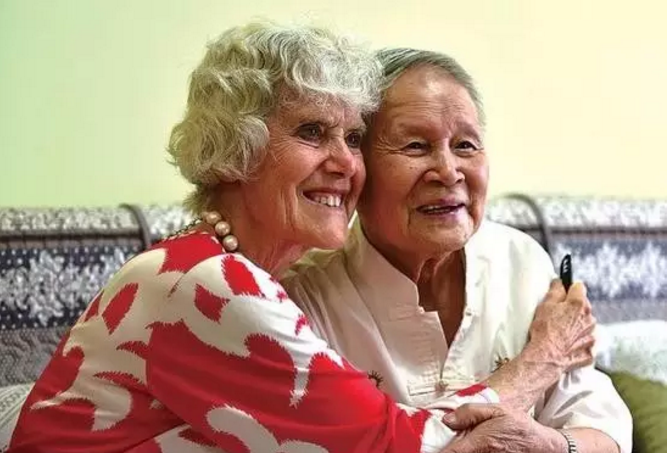A thank-you kiss comes 71 years late
- By Jason Lee
 0 Comment(s)
0 Comment(s) Print
Print E-mail China.org.cn, November 9, 2016
E-mail China.org.cn, November 9, 2016
Mary Taylor Previte, 83, hugged Wang Chenghan, 91, in Guiyang, Guizhou Province in late July, crying in tears: "I never thought the day would come. I never thought it would ever ever come."
 |
|
Mary Taylor Previte (L), 83, hugged Wang Chenghan, 91, in Guiyang, Guizhou Province in late July, crying in tears: "I never thought the day would come." |
The former state senator of New Jersey kissed the retired Chinese on his cheek emotionally. Wang smiled bashfully. That kiss is 71 years late.
Mary was born in Kaifeng, Henan Province, and was driven to Weixian Concentration Camp in Weifang, Shandong Province, from Yantai, Shandong Province, at nine years old with her elder sister, when her parents worked in a missionary school in Xi'an, Shaanxi Province.
The camp was built by the Japanese invading army in March 1942 in Weifang, which was formerly known as Weixian County, and imprisoned 2,008 European and US residents in China, including 327 children.
On Aug 17, 1945, two days after Japan surrendered unconditionally, Wang and six US soldiers were dropped by parachute into the camp to save the civilians. The camp was still heavily guarded. A big concern was if some Japanese soldiers would refuse to surrender and kill the civilians, many of whom are officials, businesspeople, teachers and clergy.
Mary's family has a long connection with China. Since her great grandfather, four generations have conducted missionary work in China.
She couldn't forget the horrible living environment in the concentration camp for her whole life. Malnutrition left many people sick and skinny. Some children could only rely on eating egg shells to replenish calcium. In winter, the Japanese army did not provide thick coats to the people. The adults had to make various kinds of clothes to help the children survive winter.
Local Chinese residents living near the camp never stopped trying to deliver them some food despite the risk of losing their lives.
Mary had been there for three years until Aug. 17, when Wang and the other six soldiers were unexpectedly dropped from a B24 of the US Air Force. They carried orders of the US army's commander-in-chief in China to induce the Japanese army to capitulate.
Wang said he had not been taught parachuting and that they were prepared to fight together with local civilians against the enemy. If the Japanese garrison army refused to surrender it would be a highly dangerous rescue mission.
Finally, the Japanese army accepted defeat. "The people were so excited that they took everything from us as a souvenir," Wang recalled the scene.
Mary said they would not have survived without the assistance of the Chinese people. She witnessed a boy being killed after falling on the power grid. He was attempting to deliver food to the foreigners in the camp, standing on the shoulder of a Chinese adult. A Chinese worker was beaten so hard after being spotted bringing food to the camp that he lost his hearing forever. And a 13-year-old child was thrown into a river and drowned to death after being beaten up by the Japanese guards, who suspected her of trying to help the Westerners.
It took the US army two months to transport all of the survivors to Qingdao, a port city in east Shandong, from where they took a ship to Hong Kong enroute to their motherland.
Their offspring visited the site of the camp in Weifang, where a museum was built. Mary started looking for the seven warriors from 1997. Before meeting Wang, she had found four of them and the widowed wives of two.
Wang's grandson read Mary's story on the internet and contacted her immediately. Mary asked Wang 16 questions through email that could only be answered by the people in that camp, and Wang gave her prompt and correct answers to all questions.
Mary brought with her 18 thank-you letters from the US Congress, New Jersey Parliament, and the US ambassador to China amongst others, and gave them to Wang.
Mary said the first time she came to China, she knocked on the ground and kissed the ground, because "China is my mother and I was kissing my mother."
"Now I have a chance to say thank you to you face to face," Mary said and hugged Wang. "Not at all," Wang replied.
Wang was born in Wuhan, Hubei Province, in 1925, and quit in the second year of his college in Sichuan University in 1943 where he studied physics. He could speak English and operate a telegraph machine, so he was employed by the US army's Office of Strategic Services in China in 1945.
Wang did not tell others his participation in the rescue mission, and his former English name was Eddie Wang.






Go to Forum >>0 Comment(s)